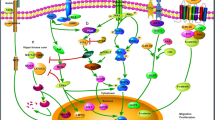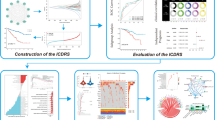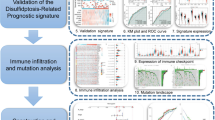Abstract
Introduction
Hepatocellular carcinoma (HCC) is one of the most lethal malignancies in the world. Previous studies indicated that the expression of the KDM1 genes (KDM1s), members of the amine oxidase superfamily, has prognostic value for breast and prostate cancer and malignant neuroblastoma. This study aimed to investigate the expression of KDM1s, their prognostic value, and their correlation with immune infiltration in patients with HCC.
Methods
Multiomics analyses were utilized to analyze differential expression, prognostic value, genetic alteration, and immune cell infiltration of KDM1s in patients with HCC.
Results
The high expression of KDM1A indicated poor overall survival (OS) and disease-free survival, whereas the high expression of KDM1B was significantly associated with poor OS. The genetic alterations and biological interaction network of KDM1s may provide detailed information for the dysregulated function of KDM1s in patients with HCC. KDM1-related signaling pathways and miRNA targets were explored and may provide value as therapeutic targets or tumor progression markers. The increased mRNA expression of KDM1s was significantly correlated with the infiltration of diverse immune cells in HCC.
Conclusions
This data-driven study indicates that KDM1s are promising prognostic biomarkers for survival and have the potential to become novel molecular targets in HCC treatments.







Similar content being viewed by others
References
Sung H, Ferlay J, Siegel RL, et al. Global cancer statistics 2020: GLOBOCAN estimates of incidence and mortality worldwide for 36 cancers in 185 countries. CA Cancer J Clin. 2021;71(3):209–49.
Petrick JL, Florio AA, Znaor A, et al. International trends in hepatocellular carcinoma incidence, 1978–2012. Int J Cancer. 2020;147(2):317–30.
Kulik L, El-Serag HB. Epidemiology and management of hepatocellular carcinoma. Gastroenterology. 2019;156(2):477–91.
Noureddin M, Rinella ME. Nonalcoholic fatty liver disease, diabetes, obesity, and hepatocellular carcinoma. Clin Liver Dis. 2015;19(2):361–79.
Selcuk H. Prognostic factors and staging systems in hepatocellular carcinoma. Exp Clin Transplant. 2017;15(Suppl 2):45–9.
Llovet JM, Montal R, Sia D, Finn RS. Molecular therapies and precision medicine for hepatocellular carcinoma. Nat Rev Clin Oncol. 2018;15(10):599–616.
Kim RD, Reed AI, Fujita S, Foley DP, Mekeel KL, Hemming AW. Consensus and controversy in the management of hepatocellular carcinoma. J Am Coll Surg. 2007;205(1):108–23.
Greten TF, Lai CW, Li G, Staveley-O’Carroll KF. Targeted and immune-based therapies for hepatocellular carcinoma. Gastroenterology. 2019;156(2):510–24.
Villanueva A. Hepatocellular carcinoma. N Engl J Med. 2019;380(15):1450–62.
Arifuzzaman S, Khatun MR, Khatun R. Emerging of lysine demethylases (KDMs): from pathophysiological insights to novel therapeutic opportunities. Biomed Pharmacother. 2020;129: 110392.
Klose RJ, Zhang Y. Regulation of histone methylation by demethylimination and demethylation. Nat Rev Mol Cell Biol. 2007;8(4):307–18.
Tsukada Y, Fang J, Erdjument-Bromage H, et al. Histone demethylation by a family of JmjC domain-containing proteins. Nature. 2006;439(7078):811–6.
Johansson C, Tumber A, Che K, et al. The roles of Jumonji-type oxygenases in human disease. Epigenomics. 2014;6(1):89–120.
Maes T, Mascaro C, Ortega A, et al. KDM1 histone lysine demethylases as targets for treatments of oncological and neurodegenerative disease. Epigenomics. 2015;7(4):609–26.
Lim S, Janzer A, Becker A, et al. Lysine-specific demethylase 1 (LSD1) is highly expressed in ER-negative breast cancers and a biomarker predicting aggressive biology. Carcinogenesis. 2010;31(3):512–20.
Metzger E, Wissmann M, Yin N, et al. LSD1 demethylates repressive histone marks to promote androgen-receptor-dependent transcription. Nature. 2005;437(7057):436–9.
Sakane C, Okitsu T, Wada A, Sagami H, Shidoji Y. Inhibition of lysine-specific demethylase 1 by the acyclic diterpenoid geranylgeranoic acid and its derivatives. Biochem Biophys Res Commun. 2014;444(1):24–9.
Wang D, Han S, Peng R, et al. Depletion of histone demethylase KDM5B inhibits cell proliferation of hepatocellular carcinoma by regulation of cell cycle checkpoint proteins p15 and p27. J Exp Clin Cancer Res. 2016;35:37.
Yamada D, Kobayashi S, Yamamoto H, et al. Role of the hypoxia-related gene, JMJD1A, in hepatocellular carcinoma: clinical impact on recurrence after hepatic resection. Ann Surg Oncol. 2012;19(Suppl 3):S355–64.
Yu S, Wang Y, Hou J, et al. Tumor-infiltrating immune cells in hepatocellular carcinoma: Tregs is correlated with poor overall survival. PLoS ONE. 2020;15(4): e0231003.
Zhang SC, Hu ZQ, Long JH, et al. Clinical implications of tumor-infiltrating immune cells in breast cancer. J Cancer. 2019;10(24):6175–84.
Zuo S, Wei M, Wang S, Dong J, Wei J. Pan-cancer analysis of immune cell infiltration identifies a prognostic immune-cell characteristic score (ICCS) in lung adenocarcinoma. Front Immunol. 2020;11:1218.
Sakamoto A, Hino S, Nagaoka K, et al. Lysine demethylase LSD1 coordinates glycolytic and mitochondrial metabolism in hepatocellular carcinoma cells. Cancer Res. 2015;75(7):1445–56.
Kim S, Bolatkan A, Kaneko S, et al. Deregulation of the histone lysine-specific demethylase 1 is involved in human hepatocellular carcinoma. Biomolecules. 2019;9:12.
Maksour S, Ooi L, Dottori M. More than a corepressor: the role of CoREST proteins in neurodevelopment. eNeuro. 2020;7:2.
Hesham HM, Lasheen DS, Abouzid KAM. Chimeric HDAC inhibitors: comprehensive review on the HDAC-based strategies developed to combat cancer. Med Res Rev. 2018;38(6):2058–109.
Shi YJ, Matson C, Lan F, Iwase S, Baba T, Shi Y. Regulation of LSD1 histone demethylase activity by its associated factors. Mol Cell. 2005;19(6):857–64.
Klajn A, Ferrai C, Stucchi L, et al. The rest repression of the neurosecretory phenotype is negatively modulated by BHC80, a protein of the BRAF/HDAC complex. J Neurosci. 2009;29(19):6296–307.
Lee M, Venkitaraman AR. A cancer-associated mutation inactivates a region of the high-mobility group protein HMG20b essential for cytokinesis. Cell Cycle. 2014;13(16):2554–63.
Sica V, Bravo-San Pedro JM, Stoll G, Kroemer G. Oxidative phosphorylation as a potential therapeutic target for cancer therapy. Int J Cancer. 2020;146(1):10–7.
Berasain C, Elizalde M, Urtasun R, et al. Alterations in the expression and activity of pre-mRNA splicing factors in hepatocarcinogenesis. Hepat Oncol. 2014;1(2):241–52.
Li T, Fu J, Zeng Z, et al. TIMER20 for analysis of tumor-infiltrating immune cells. Nucleic Acids Res. 2020;48(W1):W509–14.
Zhou R, Zhang J, Zeng D, et al. Immune cell infiltration as a biomarker for the diagnosis and prognosis of stage I-III colon cancer. Cancer Immunol Immunother. 2019;68(3):433–42.
Jiang Q, Sun J, Chen H, et al. Establishment of an immune cell infiltration score to help predict the prognosis and chemotherapy responsiveness of gastric cancer patients. Front Oncol. 2021;11: 650673.
Wang Y, Dong J, Quan Q, et al. Immune cell infiltration of the primary tumor microenvironment predicted the treatment outcome of chemotherapy with or without bevacizumab in metastatic colorectal cancer patients. Front Oncol. 2020;10:581051.
Onuma AE, Zhang H, Huang H, Williams TM, Noonan A, Tsung A. Immune checkpoint inhibitors in hepatocellular cancer: current understanding on mechanisms of resistance and biomarkers of response to treatment. Gene Expr. 2020;20(1):53–65.
Raybould AL, Sanoff H. Combination antiangiogenic and immunotherapy for advanced hepatocellular carcinoma: evidence to date. J Hepatocell Carcinoma. 2020;7:133–42.
Acknowledgements
Funding
This study, including the journal’s Rapid Service Fee, was supported by Ministry of Science and Technology (Grant No. MOST 109 2314 B 016 009
Author Contributions
All authors meet the International Committee of Medical Journal Editors (ICMJE)criteria for authorship for this article, take responsibility for the integrity of the work as a whole, and have given their approval for this version to be published.
Kuo Feng Hsu and Yen Ju Chen made contribution to the concept and design of this study. Kuo Feng Hsu, Shu-Hsien Wu and Yu Chun Ko collected and analyzed the data from several databases. Yu Chun Ko and Kuo Feng Hsu wrote the manuscript with input from Gang-Hua Lin, Chien H ua Lin, and Guo Shiou Liao.
Disclosures
Yu Chun Ko, Shu Hsien Wu, Gang Hua Lin, Chien Hua Lin, Guo Shiou Liao, Yen Ju Chen and Kuo Feng Hsu confirm that they have nothing to disclose.
Compliance with Ethics Guidelines
The data in this study is obtained from the public data sets, and therefore no ethical approval was required.
Data Availability
The data and materials used in this study are available from the corresponding author if reasonably required.
Author information
Authors and Affiliations
Corresponding authors
Supplementary Information
Below is the link to the electronic supplementary material.
Rights and permissions
Springer Nature or its licensor holds exclusive rights to this article under a publishing agreement with the author(s) or other rightsholder(s); author self-archiving of the accepted manuscript version of this article is solely governed by the terms of such publishing agreement and applicable law.
About this article
Cite this article
Ko, YC., Wu, SH., Lin, GH. et al. A Comprehensive Evaluation of Prognostic Value and Immune Infiltration of KDM1 Family in Hepatocellular Carcinoma. Adv Ther 39, 4568–4582 (2022). https://doi.org/10.1007/s12325-022-02275-2
Received:
Accepted:
Published:
Issue Date:
DOI: https://doi.org/10.1007/s12325-022-02275-2




